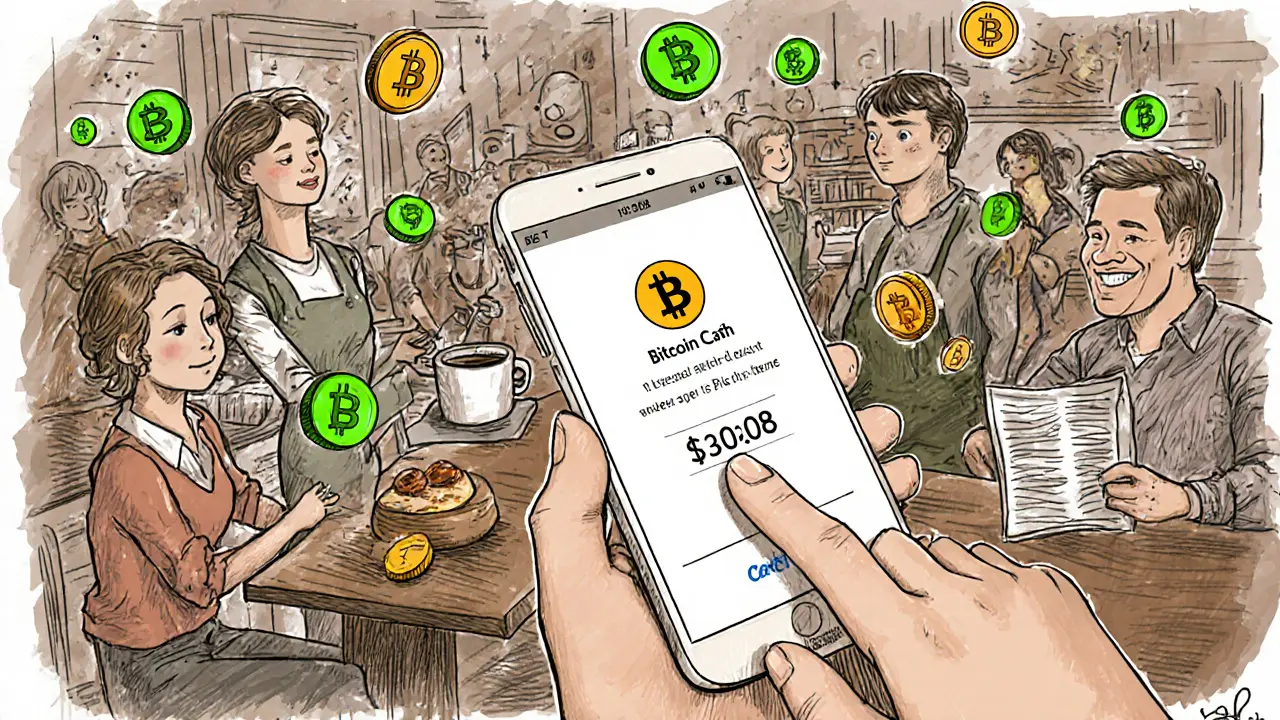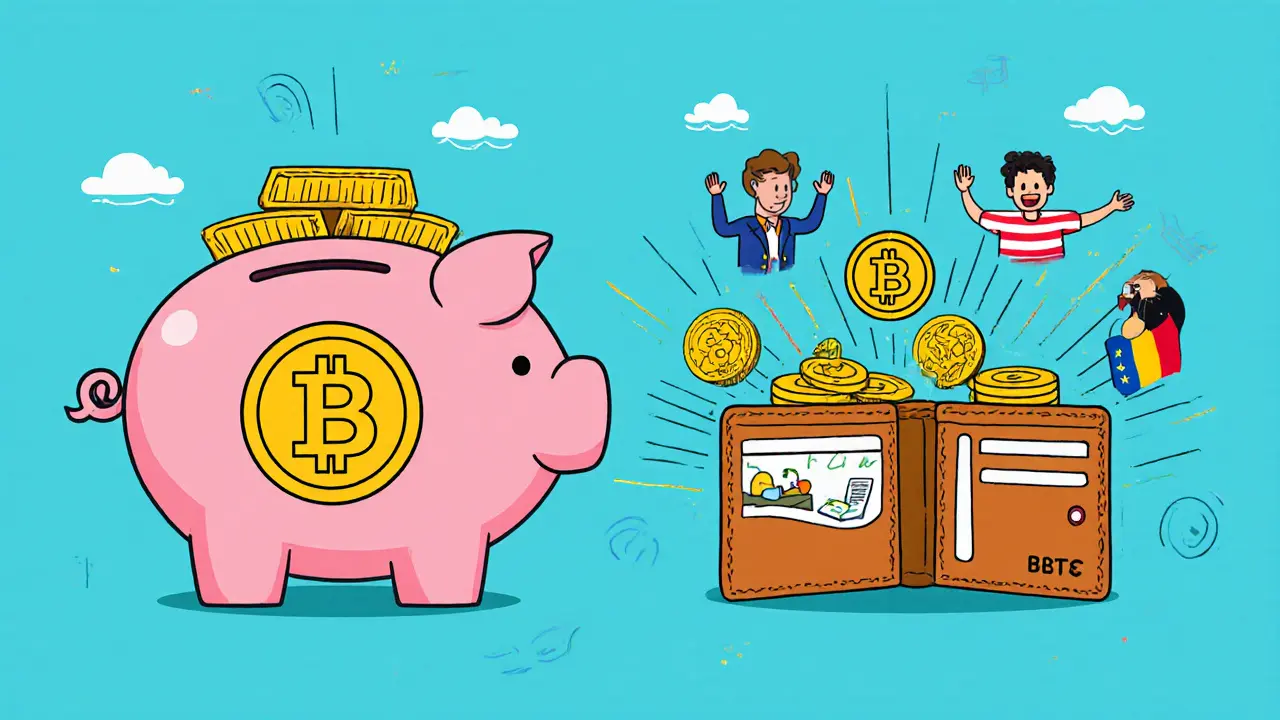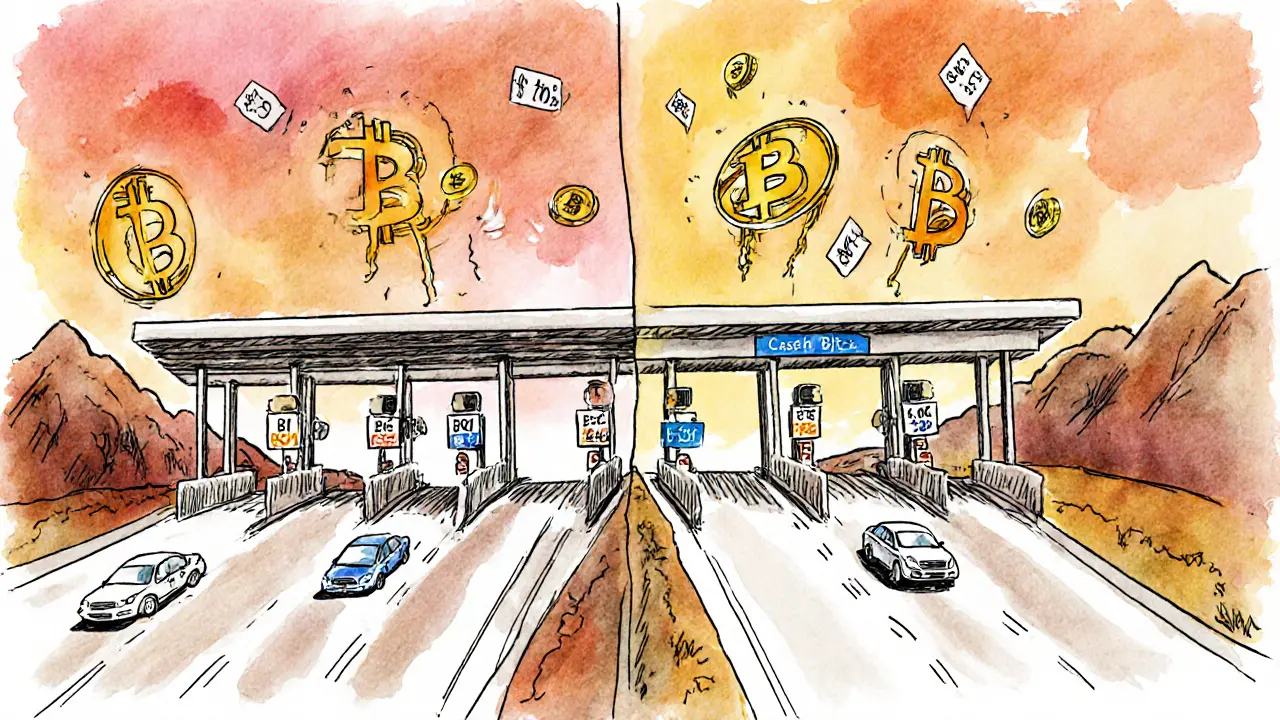Bitcoin Cash vs Bitcoin Transaction Cost Calculator
Compare Transaction Costs
See how much it would cost to send money with Bitcoin versus Bitcoin Cash.
Transaction Cost Comparison
Bitcoin (BTC)
Current average fee: $1.85
Bitcoin Cash (BCH)
Current average fee: $0.0025
With $100, you can send 0 BCH transactions versus 0 BTC transactions.
Important Notes
Bitcoin Cash transactions typically confirm in 2-5 seconds with fees as low as $0.0025, while Bitcoin can take 10 minutes with fees averaging $1.85.
Never send Bitcoin to a Bitcoin Cash address - this will permanently lose your funds. BCH uses CashAddr format (starts with 'bitcoincash:').
Bitcoin Cash isn't just another altcoin. It was born out of a real disagreement about what Bitcoin should become. On August 1, 2017, a group of developers, miners, and users who believed Bitcoin was meant to be used for everyday payments forked the original Bitcoin blockchain. They didn’t want Bitcoin to become a digital gold held in vaults. They wanted it to work like digital cash-fast, cheap, and usable at the grocery store. That fork created Bitcoin Cash (BCH).
Why Bitcoin Cash Exists
Bitcoin’s original whitepaper by Satoshi Nakamoto described a peer-to-peer electronic cash system. But by 2017, Bitcoin’s network was struggling. Transactions were slow. Fees were climbing. Some blocks took over an hour to confirm. The core team was pushing for a solution called SegWit, which restructured transaction data to fit more inside the 1 MB block limit. But others argued that wasn’t the answer. They believed the solution was simple: make the blocks bigger. So on August 1, 2017, at block 478,559, Bitcoin Cash was born. The new chain doubled the block size from 1 MB to 8 MB-later raised to 32 MB in 2018. That meant more transactions could fit into each block. No complex changes. No new layers. Just bigger blocks, like widening a highway to handle more cars. Every Bitcoin holder at that moment got an equal amount of BCH. If you had 1 BTC, you now had 1 BTC and 1 BCH. The history was identical up to that block. After that, two separate blockchains ran in parallel.How Bitcoin Cash Works
Bitcoin Cash runs on the same proof-of-work system as Bitcoin. Miners use powerful machines to solve complex math problems and add new blocks to the chain. But there are key differences.- Block size: 32 MB (vs Bitcoin’s ~1.7 MB after SegWit)
- Block time: Still 10 minutes on average, same as Bitcoin
- Difficulty adjustment: Changes every 144 blocks (about every day), not every 2,016 blocks like Bitcoin. This makes mining more stable if hash rate drops suddenly.
- Transaction speed: Confirmations often happen in under 5 seconds, with full confirmation in 10-20 minutes.
- Transaction fees: Average $0.0025 as of late 2023. You can send BCH across the world for less than a penny.
Bitcoin Cash vs Bitcoin: What’s the Real Difference?
The biggest difference isn’t technology-it’s philosophy. Bitcoin (BTC) has shifted toward being a store of value. People buy it, hold it, and call it “digital gold.” It’s used for large transfers, institutional portfolios, and long-term savings. Transaction speed and cost aren’t the priority. Security and scarcity are. Bitcoin Cash (BCH) is built for spending. It’s designed to be used like cash: pay for coffee, send money to a friend, tip a content creator. It’s not meant to be hoarded. Here’s a quick comparison:| Feature | Bitcoin Cash (BCH) | Bitcoin (BTC) |
|---|---|---|
| Block Size | 32 MB | ~1.7 MB (with SegWit) |
| Transactions per Second | ~116 | ~7 |
| Average Fee (Q3 2023) | $0.0025 | $1.85 |
| Confirmation Time (Initial) | 2-5 seconds | 10 minutes |
| Hashrate (Oct 2023) | 3.9 EH/s | 450+ EH/s |
| Primary Use Case | Everyday payments | Store of value |
| Full Nodes (Sept 2023) | ~1,800 | 15,000+ |

Where Is Bitcoin Cash Used?
As of October 2023, over 5,200 businesses around the world accept Bitcoin Cash directly. That’s up from just a few hundred in 2018. The biggest adoption is in:- Venezuela: 1,200+ merchants use BCH to bypass hyperinflation and currency controls.
- Germany: 850+ businesses, including cafes, tech shops, and online retailers.
- United States: 720+ merchants, mostly small businesses and crypto-friendly services.
What Are the Downsides?
Bitcoin Cash isn’t perfect. Here are the real challenges:- Lower security: With only 3.9 EH/s of mining power (vs Bitcoin’s 450+ EH/s), it’s theoretically easier to attack. But it’s still expensive-over $1 million to rent enough hardware for a 24-hour attack.
- Fewer full nodes: Only about 1,800 full nodes run BCH. Bitcoin has over 15,000. More nodes mean more decentralization and resilience.
- Merchant adoption is still small: You can’t pay your electric bill with BCH yet. Most people still use credit cards or bank transfers.
- Confusion with Bitcoin: Many users accidentally send BCH to BTC addresses. That’s irreversible. Wallets now warn you, but mistakes still happen.
- Development centralization: Most BCH development is led by the Bitcoin ABC team. Critics say that’s not as decentralized as Bitcoin’s broader developer base.
Can You Mine Bitcoin Cash?
Yes. You can mine BCH using the same hardware as Bitcoin-ASIC miners that use the SHA-256 algorithm. But because BCH has a much lower hashrate, mining is less competitive. If you have a decent ASIC miner and cheap electricity, you can still make a profit. Most people don’t mine BCH directly. Instead, they buy it on exchanges like Binance, Coinbase, or Kraken. You can also earn it through cashback apps, tipping platforms, or by offering goods and services in exchange for BCH.
What’s Next for Bitcoin Cash?
The BCH development team has a clear roadmap:- November 2023 (Aserti3-2d): Improved difficulty adjustment to keep block times stable.
- May 2024 (Grumble): Increase maximum transaction size to allow for more complex payments and token operations.
- November 2024 (Magnetic Cash): Speed up wallet syncing so new users can get up and running faster.
Is Bitcoin Cash Right for You?
Ask yourself:- Do you want to spend crypto, not just hold it?
- Do you need fast, cheap transactions for daily use?
- Are you tired of paying $2 in fees to send $50 to a friend?
Frequently Asked Questions
Is Bitcoin Cash the same as Bitcoin?
No. Bitcoin Cash (BCH) is a separate cryptocurrency that split from Bitcoin in 2017. Both started from the same blockchain, but BCH increased block sizes to make transactions faster and cheaper. Bitcoin (BTC) focused on becoming digital gold, while BCH focuses on being digital cash.
Can I send Bitcoin to a Bitcoin Cash address?
Never do this. Sending BTC to a BCH address (or vice versa) will permanently lose your funds. Wallets now warn you about this, but mistakes still happen. Always double-check the address format-BCH uses CashAddr (starts with ‘bitcoincash:’), while BTC uses legacy or SegWit formats.
How do I store Bitcoin Cash?
Use a wallet that supports BCH. Popular options include Electron Cash (lightweight), Exodus (user-friendly), and Ledger or Trezor (hardware wallets). Never use a Bitcoin-only wallet for BCH. Always verify the wallet’s official website to avoid scams.
Is Bitcoin Cash safe?
Yes, for everyday use. The network has never been successfully hacked. While its hashrate is much lower than Bitcoin’s, launching a 51% attack would still cost over $1 million. For sending payments, tipping, or buying goods, BCH is secure and reliable.
Can I buy Bitcoin Cash with a credit card?
Yes. Exchanges like Coinbase, Kraken, and Binance allow you to buy BCH directly with a credit or debit card. Fees are higher than bank transfers, but it’s fast and easy for beginners.
Why isn’t Bitcoin Cash more popular if it’s faster and cheaper?
Because Bitcoin has the brand, the liquidity, and the institutional backing. Most people hear about Bitcoin first. Most exchanges list BTC first. Most investors think of BTC as the only real crypto. BCH has a loyal user base and is growing, but it’s fighting against decades of branding and network effects.
Will Bitcoin Cash replace Bitcoin?
Unlikely. They serve different purposes. Bitcoin is becoming digital gold. Bitcoin Cash is becoming digital cash. You don’t need one to replace the other. You can use both. If you want to save value, use BTC. If you want to spend value, use BCH.

BCH is the real deal 🚀 I paid for tacos with it last week and the confirmation hit faster than my coffee brewed. Satoshi would’ve high-fived me. No fees, no drama. This is what crypto was meant for.
Honestly I used to think BTC was the only way, but after seeing how much it costs just to send $20, I switched. BCH feels like using cash again - not some fancy asset you gotta store in a vault. Glad I gave it a shot.
Let’s be real - BCH is a glorified fork with 1/100th the security. You think $0.0025 fees matter when your whole chain could get wiped by a well-funded actor? This isn’t innovation, it’s delusion wrapped in a block size increase.
There’s something poetic about this divide. BTC became the gold vault, BCH became the pocket change. One isn’t better - they’re just different answers to the same question: what is money? Maybe we don’t need one system to rule them all. Maybe we need both.
I’ve used BCH to send money to my mom in Mexico. No bank delays, no middlemen taking 10%. She got it in 8 seconds. I cried a little. This isn’t tech - it’s dignity.
You people are naive. BCH has 1800 nodes? BTC has 15k. That’s not a feature - that’s a death sentence. And don’t even get me started on that ABC team running everything. This isn’t decentralized, it’s a cult with a whitepaper.
The fee difference is insane. I run a small coffee shop in London. We took BCH payments for 6 months. Average transaction cost? 0.2 cents. Credit card fees? 2.9% + $0.30. The math doesn’t lie. BCH wins for microtransactions.
BCH is simple and works. No need for layers or sidechains. Just send money. Fast. Cheap. No hype. I use it every day and never look back
Wow. So you’re telling me the solution to Bitcoin’s scaling problem was... bigger blocks? Genius. Next you’ll tell me the answer to traffic jams is wider roads. 🤦♂️ Also, typo in your table. 'EH/s' not 'EH/s'. Just sayin'.
i tried bch once but sent it to a btc address 😅 lost $40. now i double check every time but still scared to use it. anyone else do that?
The real win isn’t the fees or speed - it’s that BCH lets normal people use crypto without needing a finance degree. I showed my 70-year-old uncle how to send BCH to his grandkid. He got it. He used it. That’s the future.
I used to think decentralization was just about mining power. But after reading this, I realize it’s also about accessibility. If only 1800 people run nodes, but millions use it to buy coffee - who’s really holding the power?
To the person who sent BCH to a BTC address - I did that too. I still cringe. But now I use Exodus - it auto-detects and warns you. Game changer. 🙌